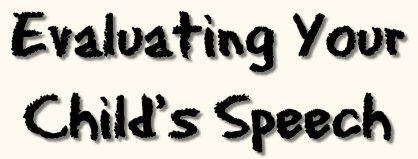
      
|
|
|
Although only a small percentage of children have serious speech defects, few parents are free from concern over minor speech problems at some stage in their child's development. A child outgrows most of these "problems" as he matures. Other problems may indeed indicate potential speech deficiencies that need to be identified, diagnosed, and, in some cases, treated. Here are some questions you can ask yourself to discover whether your child has a worrisome problem:.
If, after answering these questions, you feel your child might require speech therapy, referrals for a diagnosis can be made by your pediatrician, your hospital's speech-and-hearing clinic, or the speech consultant in your school system. For further information about the speech and hearing services offered in your area, write to your State Department of Education or your State Department of Health. The names of speech therapists who have clinical certification as wellas a list of registered clinic programs can be secured from the American Speech-Language-Hearing Association, 9030 Old Georgetown Road, Washington, DC 20014. We strongly advise against parents attempting to diagnose or to correct speech deficits without seeking professional consultation. A speech pattern that a concerned parent views as defective may, in fact, be a temporary and normal phase of development; an outstanding example of this is the period of normal childhood nonfluency, an ephemeral stage that some young children normally experiece. If a speech defect does exist, it should be fully and carefully diagnosed only by a qualified speech therapist. A few more words of caution. There's a right way and a wrong way to approach a speech defect. If, at age seven, Johnny's still saying "wabbit" instead of "rabbig," therapy might well be indicated -- but in careful stages. Johnny might be quite aware of his sound substitution, but still be unable to say the sound correctly. Merely telling him the correct way to utter the sound isn't necessarily going to bring about improvement. What Johnny may require is a combination of auditory discrimination, visual training, tactile (touching) experiences, and articulation practice. A tall order, but what's involved is this: Johnny must learn to hear the difference between the sounds w and r, both by themselves and in words; he must see the difference in his own mouth as he attempts the sounds; he must train his tongue and his lips to behave properly in forming the correct sounds; he must practice making the sounds by themselves, in conjunction with vowels, in various positions within words, in full sentences, and then in normal conversation. This plan offers a logical remedial progression, using a multisensory approach; it involves learning a new sound by breaking it down into various components; it's designed to proceed step by step so as to avoid overwhelming the child. While your child is undergoing this kind of thorough therapy, your role as a parent requires that you offer him full support and encouragement. Your cooperation with the therapist will be needed to help your child break his long-standing speech habit and retrain himself. Learn to face your feelings about your child's speech problem honestly and to deal with them openly. Is it possble you feel guilt about some episode in your child's earlier years? Do you feel embarrassed by his speech, or depressed about his difficulties? Do you worry that they won't be corrected? Do you blame someone else for your child's speech inadequacies? A conference with your child's speech therapist may go a long way toward ferreting out your best-veiled feelings and contribute a lot to your child's successful retraining. (taken from Better Speech for Your Child, by Michelle Lattman & Antoinette Seandel, published by Wideview Books, 1977.) Design and graphics © 2002 Designs by Dusty |
